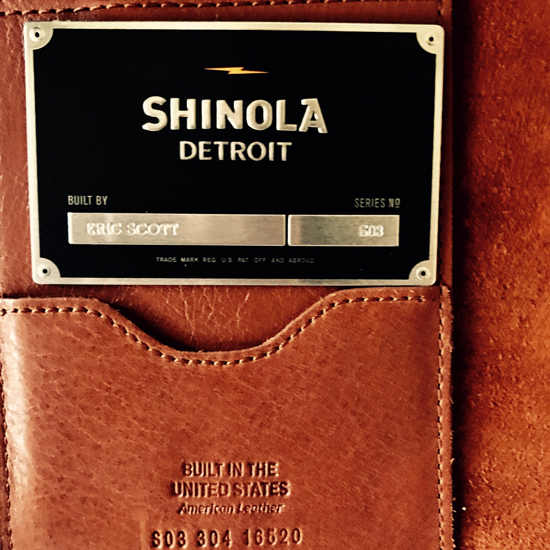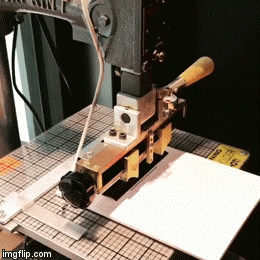Amidst the offering of Nutella shakes, grass-fed burgers, and sushi burritos, I was drawn into the newly opened Shinola store across from the food court in the King of Prussia Mall by an antique-looking machine in the window. Walking into the store, there was a faint smell of leather and musk (probably a result of their Shinola-brand candles). The space has an industrial feel that minimally and elegantly displays the company’s trademark analog watches with leather bands, a total of three burgundy sweatshirts baring the Shinola name and a few curated books. If there is a sensory experience of luxury, this was it.
Immediately, I stood in front of the wall of notebooks by the hues of hunter green, soft pink and neutral tans. I am a sucker for a beautiful notebook. As I scanned the wall, debating between the lined, graph and blank pages, a Shinola associate let me know that monogramming came free of charge. After purchasing notebook, I was able to choose a phrase to monogram, font size and ink color: gold, rose gold or silver. I opted for the traditional three letter monogram (because I caved under the weight of choosing which felt akin to selecting a tattoo, or more grave — after all, skin decays).
Later, I would return with a friend who proudly got “F*CK OFF” monogrammed, asking for the largest font available. Despite being in his early thirties, we all felt the strange sense of transgressive pleasure — perhaps it was because the phrase was pressed into a shimmering gold, serif font on a tan fabric background or that passersby might notice the phrase being pressed. Whatever the case, it is clear that embossing machine in the window was not nearly decor but a core part of Shinola experience. They can be found in all of its brick and mortar stores, a Shinola representative said.

The embossing machine’s handiwork. (Photo by Jen Rajchel)
On first impression, the exotic pull of the embossing machine may seem to be simply a nod to the nostalgia of old technology. As emerging technologies have become more haptic (e.g. fingerprint passcodes and touchscreen keyboards), there has been a renaissance of technologies which require a significant amount of manual manipulation. Should you be lucky enough to pass by as one of the Shinola employees is adorning a notebook, you can witness through the glass window the careful arrangement of letters spaced out just right, the adjustments to ensure this, the pressing and the peeling back of the film to reveal the newly printed word. (Or you can just watch this gif above.)
But the press in the window is not merely decor or a one-time nostalgic spectacle. Shinola has a catalog of products which range from bicycles to the turntable they released in late November. Shinola’s brand is focused on fostering the “glory of manufacturing” in Detroit and ending the cycle of disposability that governs the consumer market. It is making a call to return to the material and its makers.
Rather than celebrity endorsements, Shinola highlights photos of their “craftspeople.” In fact, when you purchase a leather good, a steel-like card is tucked inside with the name of the person who created it, a kind of maker’s mark. In these ways, Shinola attempts to connect us with the person whose hands carefully crafted what we are now holding in our own.

The Shinola “maker’s mark.” (Photo by Jen Rachel)
The marketing materials — both the heavily weighted paper advertisements and sleek, minimal website — are filled with the language of a manifesto such as: “Shinola believes in the beauty of industry.” The rhetoric, mission and focus on older technologies of Shinola’s brand is reminiscent of the Arts and Craft movement in mid-19th century England. The Arts and Craft Movement was a reaction to increased manufacturing and machinery and on focused on reforming social conditions, renewed commitment to design and a return to “handicraft” (a term used by William Morris, a major influencer in the Arts and Crafts circle). To drive home the comparison, the cards in the store that ask for your email information don’t ask to “connect with us” as most stores would, but instead prompt for your name and email to enlist you to “Join the Movement.”
The Shinola movement is not without its critics, and items such as the Shinola-branded candle bring into focus the corporate entity that belies its aesthetic and social movement. This brings me back to the embossing machine in the window. Its visible dance between machine and hands signals a reminder of the legacy of tech: we cannot return to any kind of labor without deeply engaging with all the politics of that labor.
Before you go...
Please consider supporting Technical.ly to keep our independent journalism strong. Unlike most business-focused media outlets, we don’t have a paywall. Instead, we count on your personal and organizational support.
Join our growing Slack community
Join 5,000 tech professionals and entrepreneurs in our community Slack today!

The person charged in the UnitedHealthcare CEO shooting had a ton of tech connections

From rejection to innovation: How I built a tool to beat AI hiring algorithms at their own game

Where are the country’s most vibrant tech and startup communities?

